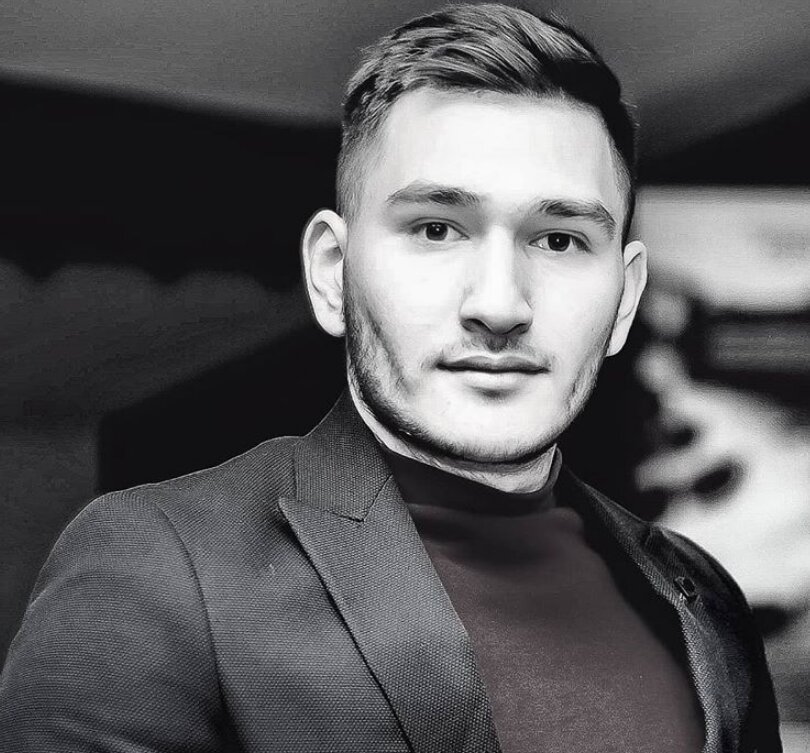«Change your life today. Don’t gamble on the future, act now, without delay.»

Chingiz Nasirov, commonly known as Chingi, was born in Russia and now lives in Prague. Born into a high-class family, Chingiz always dreamed of becoming a football player as a child. However, according to his wishes, he studied management in the Czech Republic. Until the age of 18, Chingiz was a professional footballer at FC Shagadam. After graduating from high school, Chingiz went to study in the Czech Republic and began his career there as an entrepreneur and fitness model. Today, Chingiz has several successful businesses in the environmental and IT sectors.
Have you ever felt like you hadn’t done anything? Do you know how many days a week you are actually productive?
About three. People work an average of 45 hours a week, and they themselves believe that 17 of them are unproductive.
We can all achieve so much more – but none of us wants to become a workaholic.
It would be great to redo a bunch of things and keep a balance between life and work. But how to do that? I decided to get answers to these questions.
And who better to ask if not Chingiz Nasirov – a man who has achieved a lot in life? Below are 6 tips from Chingiz, their scientific rationale and recommendations for highly productive people.

- Manage your mood
Most productivity systems are designed as if we are robots: they forget about the enormous power of the senses.
If you started your day calmly, then it will be easy to get busy and concentrate. But if you wake up, and everything around is already boiling – the phone rings, letters arrive, the alarm rings, – you spend the whole day reacting to this.
This means that you are not in control of your priorities, you are only responding to what is thrown at you, whether it is important or not.
Here is what Chingiz Nasirov says:
I try to keep the first 80-90 minutes of my day as similar as possible. I think that this procedure is necessary to feel in control of the situation – it reduces anxiety, which means it makes you more productive.
Research shows that starting the day has a huge impact on productivity, and you procrastinate more when you’re in a bad mood. Happiness improves productivity and makes you more successful.
Sean Achor writes in The Happiness Advantage:
… positive-minded doctors are almost three times more successful at solving intellectual and creative problems and make accurate diagnoses 19% faster than doctors in a neutral state. Optimistic salespeople outperform their pessimistic counterparts by 56%. It turns out that our brains are wired to act best, not when your mood is negative or neutral, but when your mood is positive.
So think a little less about work management and a little more about mood management.
- Don’t check your email in the morning
Someone will think that this is complete nonsense. Many people cannot imagine what it is like to wake up and not immediately check their mail or social media feed.
I’ve talked to a lot of very productive people, and none of them said, “Spend more time in email.”
Why is it a mortal sin to check your email in the morning? Because by doing this you doom yourself to a reactive attitude towards life. A letter arrives, and now you are giving the best watch to someone else’s goals – strangers, not yours. You don’t plan your day, you don’t prioritize. You let someone, who has decided to send you a letter, dictate terms to you.
Self-deception and procrastination?
Chingiz says:
… if possible, don’t check your email for the first hour or two after getting up. It’s hard for some people to imagine. “How so? I need to check my email to get the information I need to work on the important items on my to-do list. “
You will be surprised how often this is not the case. You may need to check your inbox to complete the most important tasks on your list 100%. But can you do 80% or 90% of them before you log into Gmail and your brain explodes with anxiety, dopamine arousal, and cortisol panic? Yes.
Research shows that emails:
tire;
make you behave like an idiot;
can be more addictive than alcohol or tobacco;
Checking your mailbox often takes 10 points away from your IQ score.
Is this really what you want at the start of your day?
- Before doing something faster, ask yourself if you need to do it at all
Everyone asks: “Why is it impossible to do everything?” And the answer is stunningly simple:
Because you are doing too much.
Want to be more productive? Don’t ask how to do something more efficiently, first answer: “Do I need to do this at all?”
Here is what Nasirov says:
I think this is the problem with most productivity and time management advice: they focus on how to get things done quickly. But most of the things people do quickly don’t need to be done at all. It’s funny that we always complain about not having enough time, and then prioritize things like time is infinite. Instead, do only what is important. And no more.
But does this work in the real world?
Research shows that managers do not succeed because they work longer. They achieve more when they follow a clear plan.
- Concentration is eliminating distractions
Ed Hallowell, a former Harvard School of Medicine professor and bestselling author of Driven to Distraction, says we have “culturally generated attention deficit disorder.”
Has modern life spoiled the stability of attention forever?
Not. We just have something that humanity has never had before – more attractive, easily accessible, shiny things that are constantly available.
The solution is to hide away from all those shiny and buzzing distractions.
Chingiz says:
Concentration primarily depends on how much you limit the possibilities for procrastination. It is the ability to go to the isolation ward, realizing that you have to work, and close the door. That’s all.
How can all the research on this topic be summed up? How about this: distractions make you stupid.
A number of studies show that the simplest and most effective way to change your behavior is to change your environment.
Top executives in companies are distracted every 20 minutes. How do they even manage to do anything? They work from home for 90 minutes in the morning, when no one is distracting them.
- Start a personal system
I have interacted with a lot of insanely productive people. Do you know what I haven’t heard from any of them?
“I don’t know how I manage to do things. I just relax and hope for the best. “
None of them said that. Your regime may be formal and scientifically based, or very personal and unlike anything else – but productive people have a regime either way.
Defining a regime and system is a more effective approach than relying on self-control. Allowing yourself to do things that you did not decide to do in advance is to create insecurity and set yourself up for failure. I convince people to establish a regime so that they have to make decisions only about the most creative aspects of work or in the area where their talent lies, ”says Chingiz Nasirov.
The right systems work because they automate processes and do not test your very limited willpower.
What do we see when we study the great geniuses of all time? Almost everyone had a personal regimen that suited them.
How to start developing your personal system? Use the 80/20 formula.
What kind of activity leads you to success?
What kind of activity completely undermines your productivity?
Redesign your schedule to do more things from # 1 and eliminate as many things from # 2 as possible.
- Set your goals the night before
Wake up knowing in advance what is important before daily pseudo-surprises rush into your life and your inbox beeps for new commands.
Define one or two of the most important tasks before dinner the night before, says Nasirov.
Business bestselling author Dan Pink gives similar advice:
Create a final ritual. Know when to stop working. Also try to end your workday at the same time. Organize your desk. Make a backup on your computer. Make a to-do list for tomorrow.
Research says it’s easier to get things done by being specific and writing down your goals.
This has another advantage: By writing down goals for tomorrow, you reduce anxiety and can enjoy the evening.
The word “productivity” sounds like we are talking about machines. But the irony is that how good you are is largely dependent on feelings. How should you feel while working? Busy but not overwhelmed. That’s when people are happiest, research says.
I couldn’t have written all this without the help of Tim Ferris and Adam Grant. Both donated their very valuable time.
Was it a waste of time on their part? They definitely won’t be able to get him back.
Helping others takes time, but research shows that it makes us feel like we have more time. And it makes us happier.
As you become more productive, you will have more time to fill. So why not use it to make others and yourself happier?


